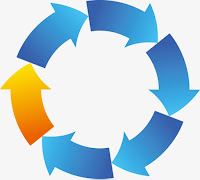The first step is Wondering: defining the need for information. (Students will probably think or say "I wonder why I have to do this?") There are all kinds of things I wonder about and look up on the internet, close to, if not actually, daily. Unfortunately, I couldn't pick just any topic, so no researching about what movies are playing in town, or using natural oils to replace the harsh chemicals you use, or whether a South Beach, low carb, or Keto diet is better for diabetics. I need to pick a topic that is of a professional interest to me. (Yuck, right?). So, I decided to research something that has been on my mind, that makes me feel hopeless, since the math standards in Georgia changed, first to GPS, then to CCGPS, then to GSE, the loss of the Technical Track high school diploma, and the "one size fits all" feel to education now. My question is "What are the cognitive growth milestones for math reasoning, at what age are they reached, and what role does IQ play in this?" While working on my masters, I took a course on how the brain works related to teaching and learning. I remember a class discussion, that probably was part of this course, about the abstract idea of a variable representing an unknown quantity, the student with an average IQ developing the ability to grasp it around the 9th grade, slow learners grasping it later in high school, and students with slight mental handicaps, never able to grasp it at all - though they can live independently and be productive members of society. Forcing all students to take high level mathematics really bothers me, as students used to be able to take the Concepts courses and Money Management in high school, which would not prepare them for college, but would prepare them for tech school or life in general. I have even met people who went this route and make over twice what I do, with my master's degree.
The second step is Seeking. So, off I go! Into the wild, wild, web! Hold on, I'll be right back...
...that didn't take too long, did it? I tried Googling "developmental math milestones" and got mostly information for babies, toddlers and elementary school milestones. I did get one article, that shows students can solve simple problems with variables in middle school. But, I want something dealing with mental ability to understand reasoning skills, so I'm going to try refining my search. Hold on...Okay, I found this article when I added "cognitive" to my search, but the article is intended to draw attention to cognitive abilities and mathematics so that more research can be done, and it was written in 1985. Most of the rest of the information pertained to teaching students, not how students develop. So, time to adapt, again...Yes! That was so much better! I searched "age develop ability abstract mathematical thinking" and found this article and this article. Both of them mention that abstract reasoning skills normally develop later, and one mentioned Piaget. That was what I was looking for - it was his theories that I learned in my M.A.T. program. So, now to gather information about Piaget's theory for the "formal operational stage". I found several articles once I included "Piaget" in my search: one article describes the stages of development and says abstract reasoning begins at 12 and develops through adulthood, another is mostly about adults, says abstract reasoning begins to develop at 12 - given sufficient IQ and mentions working with a child to improve abstract reasoning - eventually increasing his IQ, another describes development and says from an early age, parents need to read to their children, talk to them, and help them explore the world around them, but you can make up for this later if lacking. These two articles, one and two, mention that some people disagree with Piaget, but say that the development isn't as even and doesn't always occur at those times. At this point, I went back to my Wondering stage, and changed to "What can I do as a teacher or a media specialist to help students who are not yet able to think abstractly?" I found a lot of articles geared toward parents of young children, that suggested reading aloud to them, engaging them in stimulating learning activities, and talking out loud as you make decisions to model abstract thinking. I did find an interesting article, that included an interview of a physics teacher, and mentioned testing the students abstract thinking at the beginning of the course, tailoring questions and activities to those levels, and working with them to increase the abstract thinking abilities. I found the test he used, Lawson, the answer key, and scoring and interpreting the results. Just for fun, my 14-year old daughter and I both took the test and scored in the higher order thinking skills level, oddly enough with the same score. Both of us got a different questions wrong, based on misinterpreting it, mine dealing with gravity and hers with saturation.
At this point, I had a lot to think about, took a break, and went to sleep!










